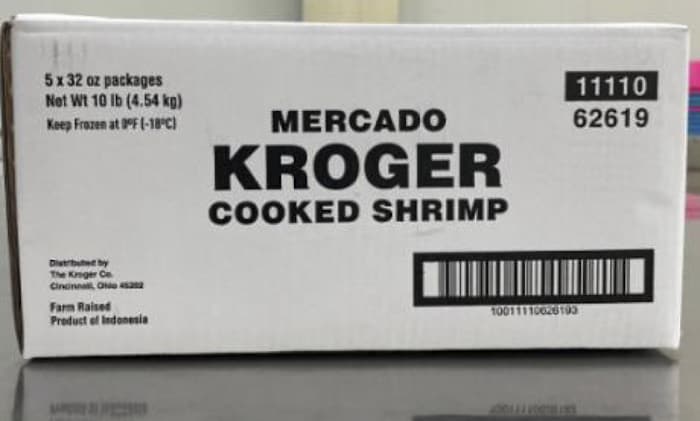Share this @internewscast.com

A seafood distributor in Seattle has expanded its recall of cooked and frozen shrimp sold at Kroger stores throughout the U.S. due to persistent fears about potential radioactive contamination.
On Saturday, Aquastar Corp. pulled back almost 157,000 more pounds of shrimp over worries about contamination with cesium 137, a radioactive isotope. This recall comprises nearly 50,000 bags of Kroger Raw Colossal EZ Peel Shrimp, roughly 18,000 bags of Kroger Mercado Cooked Medium Peeled Tail-Off Shrimp, and over 17,000 bags of AquaStar Peeled Tail-on Shrimp Skewers.
The shrimp products were available from June 12 to September 17 in grocery stores across more than 30 states, including outlets like Bakers, City Market, Dillons, Food 4 Less, Foodsco, Fred Meyer, Fry’s, Gerbes, Jay C, King Soopers, Kroger, Mariano’s, Metro Market, Pay Less Supermarkets, Pick ‘n Save, Ralph’s, Smith’s, and QFC.
The company previously recalled shrimp products in August.
This new recall is another move in an ongoing probe into potential cesium 137 contamination, a byproduct of nuclear reactions, as reported by the U.S. Food and Drug Administration. While the risk is assessed as small, long-term exposure could pose a “potential health concern,” FDA representatives noted.
In August, the FDA issued a safety alert advising consumers against consuming specific frozen shrimp imported by PT. Bahari Makmur Sejati, an Indonesian entity known as BMS Foods. Cesium 137 was found in containers from the company sent to various U.S. ports and in a frozen breaded shrimp sample.
The FDA stressed that none of the shrimp alerting for or testing positive for cesium 137 was sold to the public. However, the agency indicated that other shipments to stores might have been produced in conditions allowing contamination.
The FDA posted an import alert to stop potentially contaminated shrimp from entering the U.S. More than 3 million pounds of shrimp exported by BMS Foods has arrived at U.S. ports in September, according to U.S. Customs and Border Protection records.
Contaminated metal at the industrial site in Indonesia where the shrimp processor is located may be the source of the radioactive material, officials have said. The International Atomic Energy Agency said evidence suggests that activities at a smelting facility or from disposal of scrap metal could be the cause.
U.S. officials have declined to respond to detailed questions from The Associated Press about the source or extent of the contamination.
Experts in nuclear radiation agree that the health risk is low, but they say it’s important to determine the contamination’s source and share that information with the public.
The level of cesium 137 detected in the frozen shrimp was about 68 becquerels per kilogram, a measure of radioactivity. That is far below the FDA’s level of 1,200 becquerels per kilogram that could trigger the need for health protections.
___
The Associated Press Health and Science Department receives support from the Howard Hughes Medical Institute’s Department of Science Education and the Robert Wood Johnson Foundation. The AP is solely responsible for all content.
Copyright 2025 The Associated Press. All rights reserved. This material may not be published, broadcast, rewritten or redistributed without permission.














